[This is the text version of my video, “Daniel Chapter 8”.]
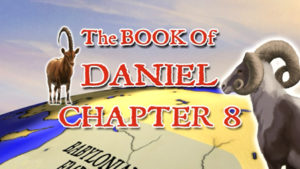 This is our fourth class on Bible prophecy and this time we are looking at Daniel chapter 8. I’ll be honest with you: this class can be a bit of a challenge. Maybe you remember that in the class on Daniel chapter 7, I said it was like we were going to climb up into the mountains of Bible prophecy. That can certainly also be said of Daniel chapter 8. In fact, it’s going to get a little steep. But we’re going to learn some amazing things and we’ll be getting a lot closer to the summit. So hold on, the chapter begins like this.
This is our fourth class on Bible prophecy and this time we are looking at Daniel chapter 8. I’ll be honest with you: this class can be a bit of a challenge. Maybe you remember that in the class on Daniel chapter 7, I said it was like we were going to climb up into the mountains of Bible prophecy. That can certainly also be said of Daniel chapter 8. In fact, it’s going to get a little steep. But we’re going to learn some amazing things and we’ll be getting a lot closer to the summit. So hold on, the chapter begins like this.

Daniel 8:1 and 2 In the third year of the reign of King Belshazzar a vision appeared to me, Daniel, after that which appeared to me at the first.

And I saw in a vision; and it came to pass, when I saw, that I was at Shushan in the palace, which is in the province of Elam; and I saw in a vision, and I was by the river of Ulai.
 The province of Elam is the area that is today the west and south-west of modern Iran, or Persia as it is called in the Bible. Shusan, as the Jews called the city, was the capital of the province of Elam at the time. Historically the city is called Susa. It was approximately 230 miles east of Babylon.
The province of Elam is the area that is today the west and south-west of modern Iran, or Persia as it is called in the Bible. Shusan, as the Jews called the city, was the capital of the province of Elam at the time. Historically the city is called Susa. It was approximately 230 miles east of Babylon.
Daniel chapter 8 has some similarities to chapter 7. There Daniel had a vision of 4 beasts, symbolizing 4 kingdoms. In chapter 8 we are going to see two beasts, but with more detail than before. And from those 2 beasts we are going to be propelled into the future, to a time soon to come.
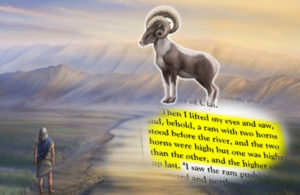 Daniel 8:3 Then I lifted mine eyes and saw, and, behold, a ram with two horns stood before the river, and the two horns were high; but one was higher than the other, and the higher came up last.
Daniel 8:3 Then I lifted mine eyes and saw, and, behold, a ram with two horns stood before the river, and the two horns were high; but one was higher than the other, and the higher came up last.
We don’t have to wonder or guess what this ram signifies because it tells us clearly in verse 20 of this chapter. “The ram which you saw, having two horns, are the kings of Media and Persia.”
So this ram in chapter 8 corresponds to the bear in the vision of chapter 7. And it represents the same as the chest and arms of silver in chapter 2. In each of these three chapters there is a different representation of the dual kingdom of the Medes and Persians.
And what does that signify, one horn being “higher” than the other and this one “coming up last”? The Persians were certainly stronger than their allies the Medes. But the Persians came up after the Medes had snuck in under the walls of Babylon by night and defeated it in 538 BC.
Daniel 8:4 I saw the ram pushing westward and northward and southward; so that no beast could withstand him, nor was there any that could deliver from his hand; but he did according to his will, and became great.
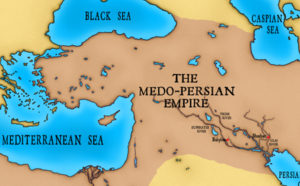 If we looked, from the time that Daniel wrote this, forward into the future, we would see that the Persians did conquer lands and peoples to the south, to the north and to the west. Once they defeated the Babylonians, the Persian kings eventually held sway over parts of Egypt, the eastern Mediterranean and much of what is modern Turkey.
If we looked, from the time that Daniel wrote this, forward into the future, we would see that the Persians did conquer lands and peoples to the south, to the north and to the west. Once they defeated the Babylonians, the Persian kings eventually held sway over parts of Egypt, the eastern Mediterranean and much of what is modern Turkey.
The vision continues in verse 5:
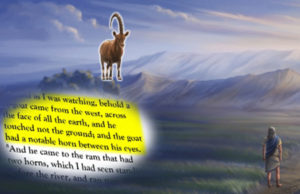 And as I was watching, behold, a he goat came from the west across the face of all the earth, and he touched not the ground; and the goat had a notable horn between his eyes.
And as I was watching, behold, a he goat came from the west across the face of all the earth, and he touched not the ground; and the goat had a notable horn between his eyes.
And again, there’s no need to guess or wonder what this goat represents. It tells us plainly in verse 21 of this chapter. “And the rough goat is the kingdom of Greece: and the great horn that is between his eyes is the first king.”
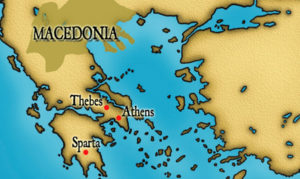 Greece back then was mostly a collection of what are called “city states”, not really a united kingdom but more a collection of independent cities, such as Athens, Thebes, Sparta and others. The great horn of this goat represents “the first king.” We know him as Alexander the Great. He came from Macedonian, an area to the north of modern Greece.
Greece back then was mostly a collection of what are called “city states”, not really a united kingdom but more a collection of independent cities, such as Athens, Thebes, Sparta and others. The great horn of this goat represents “the first king.” We know him as Alexander the Great. He came from Macedonian, an area to the north of modern Greece.
In chapter 8, the goat “touched not the ground”, symbolizing speed, certainly a characteristic of Alexander’s swift conquest of most of the known world of his day in only 10 years. In Daniel chapter 7, Greece is seen as a leopard, one of the fastest of animals. And in Daniel 2 Greece is the belly of brass. All three of these are visualizations of the empire of the Greeks that was to come.
At the age of 19, Alexander took over the army of Macedonia in 332 B C, after the assassination of his father, Philip. Alexander had been groomed from childhood for greatness. At the time of his birth, signs and omens were reported which pointed towards Alexander being marked by Destiny for future greatness. His father had him taught by the best tutors as he grew to manhood. One of those was the famous Greek philosopher, Aristotle.
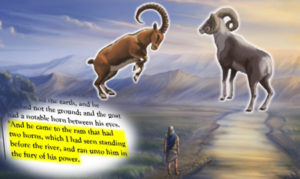 Daniel 8:6 And he came to the ram that had two horns, which I had seen standing before the river, and ran unto him in the fury of his power.
Daniel 8:6 And he came to the ram that had two horns, which I had seen standing before the river, and ran unto him in the fury of his power.
We can look back into history and see that this all actually did take place. But it’s easy to not appreciate the total miracle of it all. A specific kingdom and king are being predicted to come to world dominance, over 200 years before it happens. And for them to defeat the Persians who weren’t even in power yet.
 Daniel 8:7 And I saw him come close to the ram, and he was moved with anger against him, and struck the ram, and shattered his two horns. There was no power in the ram to withstand him, but he cast him down to the ground, and trampled him: and there was no one that could deliver the ram from his hand.
Daniel 8:7 And I saw him come close to the ram, and he was moved with anger against him, and struck the ram, and shattered his two horns. There was no power in the ram to withstand him, but he cast him down to the ground, and trampled him: and there was no one that could deliver the ram from his hand.
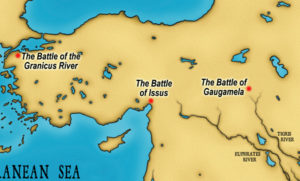 Alexander had three main battles with the Persians, first at the Granicus River. Then at the Battle of Issus. And then, the ultimate one, the battle of Gaugamela.
Alexander had three main battles with the Persians, first at the Granicus River. Then at the Battle of Issus. And then, the ultimate one, the battle of Gaugamela.
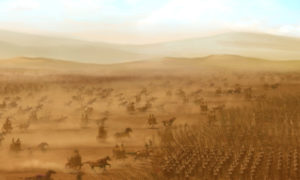
The purpose of this class is not to zero in on Alexander the Great. But this battle of Gaugamela was so amazing that I’ve read it is still studied in war colleges by military historians and teachers to this day. Alexander and his 40,000 troops were outnumbered by as much as 10 to 1. The Persian king, Darius III, had a vast army. But Alexander and his forces, through speed and military genius, routed the Persians and nearly captured the Persian king as he fled the battle field. As Daniel saw in this vision, 200 years before it happened, there was no power in the ram to deliver but the goat prevailed.
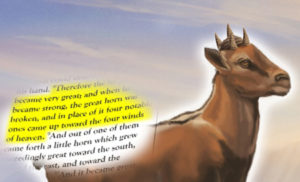 Daniel 8:8 Therefore the he goat became very great: and when he became strong, the great horn was broken; and in place of it four notable ones came up toward the four winds of heaven.
Daniel 8:8 Therefore the he goat became very great: and when he became strong, the great horn was broken; and in place of it four notable ones came up toward the four winds of heaven.
“When he was strong, the great horn was broken”. When Alexander was nearly 33 years old, he died of a high fever in a palace in Babylon. He had no son of age to succeed him. And so his empire was divided between his 4 top generals, just as Daniel had seen in this vision. In Daniel 7 the leopard had four heads and 4 wings, another picture of the future dividing of the empire of Alexander that was to come
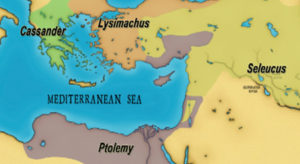
After Alexander’s untimely death, his 4 top generals divided his empire into 4 different regions or areas. Cassander ruled Macedonia and Greece, Lysimachus the area we today know as Turkey, Seleucus the region from Syria to India, and Ptolemy the eastern Mediterranean, Egypt and parts of north Africa.
At the beginning of the class I told you that this chapter is again going to be a little like mountain climbing and, at one point, it’s going to begin to get steep. That’s where we are now. But it’s going to happen in similar way to what we saw in Daniel 2 and in chapter 7. Now at this point, Daniel chapter 8 will jump forward, into the future and into a higher realm. Some new information is going to be introduced as well as some new words or phrases you’re possibly not familiar with.
 Daniel 8:9 And out of one of them came forth a little horn, which grew exceeding great toward the south, and toward the east, and toward the pleasant land.
Daniel 8:9 And out of one of them came forth a little horn, which grew exceeding great toward the south, and toward the east, and toward the pleasant land.
Verse 9 says, “out of one of them”. In other words, out of one of the four divisions of Alexander’s Empire, “came forth a little horn”. We saw this “little horn” in the last part of Daniel 7. It’s the same thing here.
At that time I introduced to you the word, “the Anti-Christ”, the devil possessed dictator of the Last Days before the establishment of the Kingdom of God on earth. And it says this little horn “grew exceeding great towards the south and the east and the pleasant land”. “The pleasant land” is a phrase referring to the land of Israel.
You may realize that this seems to indicate an actual location for the rise, or the origin of, this powerful future world ruler. And the only division of Alexander’s empire that this would fit without duplicating the directions mentioned would be Egypt.
I’m not going to insist with certainty that this future leader of the Last Days arises out of the former Egyptian segment of Alexander’s empire. Some people mention verses from elsewhere in Daniel, and from Ezekiel, that this dictator will arise out of the land area of Russia. My guess is that he will have some background, or something to do, with both places. But again, I’m not saying I’m sure.
Daniel 8:10 And it became great, even to the host of heaven; and it cast down some of the host and of the stars to the ground, and trampled them.
In Daniel 7, the little horn became the main subject of the prophecy. And we’re seeing the same here. This dictator will try to fight the people of God and God Himself. Some think this “casting down the host and the stars to the ground” represents the Antichrist, trying to fight against the angelic forces of God. But it is more likely a representation of “the host” of believers on earth, the people of God, who this dictator will seek to destroy.
In relation to this and speaking about the Last Days, Daniel 12:3 says,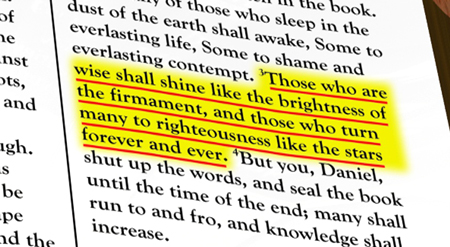 “Those who are wise shall shine like the brightness of the firmament and those who turn many to righteousness like the stars for ever and ever.”
“Those who are wise shall shine like the brightness of the firmament and those who turn many to righteousness like the stars for ever and ever.”
That verse compares God’s people of faith in the Last Days to stars, shining brightly for God. So prophecy does not just give a picture of defeat and sorrow for the forces of God in these times to come. Daniel 12 verse 3 speaks about those future times before the return of Jesus and says there will be those who will be “turning many to righteousness”. Maybe you’ll be one of those.
Daniel 8:11 Yea, he magnified himself even unto the Prince of the host, and by him the daily sacrifice was taken away, and the place of his sanctuary was cast down.
This is still talking about “the little horn”, the Antichrist of the endtime. And it says “he magnified himself.” He will be the ultimate in a pride-filled man. This little horn magnifies himself “even to the Prince of the host”. This Prince of the host had another name in Daniel 7, the “Son of Man”, Jesus of Nazareth. The Antichrist will boast himself to be equal to Jesus and will say he is worthy of the worship of all the peoples of the earth. But then it says, “and by him ‘the daily sacrifice’ was taken away, and ‘the place of his sanctuary’ was cast down“.
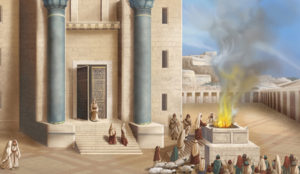
This is the first place we hear anything about “the daily sacrifice” or “the sanctuary”. So you may be saying, “What is the “daily sacrifice? What’s “the sanctuary?” That’s what I said the first time I read this. Let me somewhat answer that and then leave the rest till later. In the religion of the Jews, part of their worship included the offering of animal sacrifices. And this was involved with “the sanctuary” in Jerusalem. We’ll be hearing more about this and it’s going to become increasingly important. But if you don’t understand it right now, that’s ok.
Daniel 8:12 And an army was given him against the daily sacrifice because of transgression, and he cast down the truth to the ground; and practiced and prospered.
He is going to be, not only a man of great words, but a mighty military man as well and will have a strong army to back him. Again there’s the mention of “the daily sacrifice”. And we read that the truth will be “cast to the ground”. This man of sin will hate and oppose the truth. And for a time, he will “practice and prosper“.
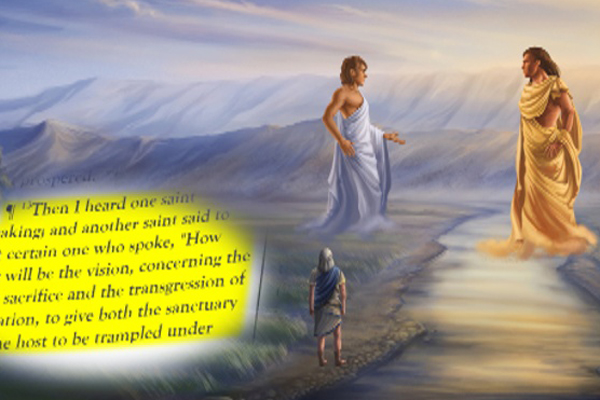 Daniel 8:13 ¶ Then I heard one saint speaking, and another saint said to that certain one that spoke, “How long will be the vision concerning the daily sacrifice, and the transgression of desolation, to give both the sanctuary and the host to be trampled underfoot?
Daniel 8:13 ¶ Then I heard one saint speaking, and another saint said to that certain one that spoke, “How long will be the vision concerning the daily sacrifice, and the transgression of desolation, to give both the sanctuary and the host to be trampled underfoot?
My sympathies always lie with the folks who are having this class for the first time. If that’s you, I can understand if you feel like this is just more than you’re able to grasp right now. So let’s slow it down a bit more and look closely at all this.
First, just one small thing, this “ ¶” is a “paragraph sign”. It may or may not show up in your Bible, but this is a new paragraph in the original text. So this is a completely new part of the vision or prophecy.
Daniel sees these two “saints”, most likely these two are angels. Daniel sees one of them ask the other one that question we just read. And here again is that word “daily sacrifice”. We’re beginning to hear a lot about that. Must be important.
And there’s that word “sanctuary” again. We said that was the place that had to do with the sacrifices. And then there’s another strange phrase, a new one: “the transgression of desolation”.
This is getting steep. We’ve seen rams, goats, Alexander the Great, angels, the Antichrist and then some new phrases you may not even understand. But just hold to all this. We’re nearly at the place where the angel Gabriel is going to come down and explain it all to Daniel face to face in the next few verses.
So one angel is asking the other one how long will it take for all these things to happen. Already in this chapter we’ve been getting some clues about where the Antichrist will come from. Now here’s something about how much time this will all take.
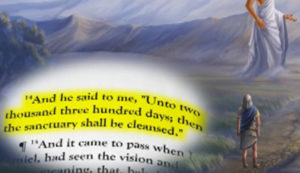 Daniel 8:14 And he said to me, “Unto two thousand, three hundred days; then shall the sanctuary be cleansed.”
Daniel 8:14 And he said to me, “Unto two thousand, three hundred days; then shall the sanctuary be cleansed.”
One angel asked the other angel; but then the answer was directed to Daniel: 2000 and 300 days. Then shall “the sanctuary” be cleansed. That’s a period of time of around 6 years and 4 months.
I’ve used the analogy several times of mountain climbing in relation to the study of the prophecies of Daniel. Well, I can tell you that right around here can be some of the most difficult parts of the climb. I think it can especially have to do with some of these new phrases that come in right here, “the sanctuary”, the “transgression of desolation”. And you may have no idea what they’re talking about.
Many of you are Christians; or at least you have some Christian friends. So let’s pull back from Daniel in the Old Testament for a moment and look at what Jesus said about these very subjects when He was alive on earth. 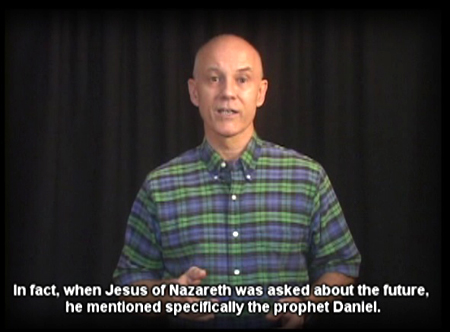 In the Daniel chapter 2 video class I gave, we looked at where Jesus was speaking about the prophet Daniel. The text to that video at one point said this:
In the Daniel chapter 2 video class I gave, we looked at where Jesus was speaking about the prophet Daniel. The text to that video at one point said this:
In fact, when Jesus of Nazareth was asked about the future, He mentioned specifically the prophet Daniel. He said “When you shall see… (the future events) …spoken of by Daniel the prophet (whoever reads, let him understand)…”
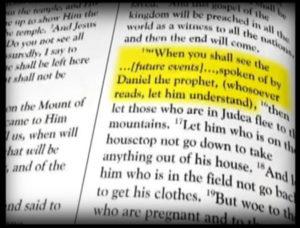 And, you might have wondered, “Did Jesus really say, ‘future events’”? And you’d be right, Jesus didn’t use those words. I substituted “future events” into that verse, at that time, because I felt, if I’d put there what it fully said, then you might not have understood it right then.
And, you might have wondered, “Did Jesus really say, ‘future events’”? And you’d be right, Jesus didn’t use those words. I substituted “future events” into that verse, at that time, because I felt, if I’d put there what it fully said, then you might not have understood it right then.
But, let’s look at that verse again and, this time, see what Jesus fully said in Matthew 24:15.
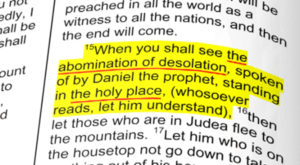 “When you shall see the abomination of desolation, spoken of by Daniel the prophet, standing in the holy place (whosoever reads, let him understand).
“When you shall see the abomination of desolation, spoken of by Daniel the prophet, standing in the holy place (whosoever reads, let him understand).
I emphasized two phrases when I read that because we are now including them here and they are going to become more important to this class and the ones on Daniel chapter 9. Earlier we read about “the sanctuary” in Daniel chapter 8, verses 11, 13 and 14

This word “sanctuary” in Daniel chapter 8 is what Jesus meant by “the holy place”, or as it was called then, the Temple in Jerusalem. But Jesus said, “When you shall see, the abomination of desolation, standing in the holy place”.
I remember the first time I read this, I just really didn’t understand it. English is my first language and I’d virtually never heard the word “abomination”. What’s “the abomination of desolation”? And it’s going to be standing in a temple somewhere?
I am going slow here but this is important. These things are going to become some of the main points or subjects as we go forward. And they are referring to prophecies in the Bible that have not yet happened, things that we might just soon see, in our times.


Maybe you didn’t know it but there are people alive today who are ready to build the 3td Jewish temple in Jerusalem. Their hope is to begin again to offer ritual sacrifices in this temple that they hope to build on Mount Moriah, the current location of the Islamic Mosque of Omar, also called the “Dome of the Rock”.
For over 1900 years there’s been no Jewish temple and no ritual scarifies offered by the Jews. In fact, from 70 AD till 1948, the Jewish nation of Israel did not exist, at least not within the boundaries of the original kingdom in the times of David and the Prophets. But since 1948, there has been a nation of Israel in the Middle East.
When we look to the prophecies of the future, both in what Jesus said and what He quotes from the prophet Daniel, we can see that there will again be a “holy place”. And Daniel speaks of “the daily sacrifice” in the Last Days. For 1900 years, this was impossible. But in our times, with the Jews returned to their ancestral homeland, all that is needed is some kind of “peace agreement” to make conditions possible for this temple to be rebuilt and the sacrifices to begin.
If we look again at verses 13 and 14, it may not all become totally clear. But perhaps you’ll be getting a better idea of how this can be fulfilled, even in our times. The angel was asked how long the time would be for the daily sacrifices and the “transgression of desolation”, another phrase for “abomination of desolation”. And Daniel was told: about 6 years and 4 months.
And maybe you remember in Daniel 7 that the prophet was told of another significant period, “a time, times and half a time” (Daniel 7:25). The “little horn” would be given that much time, 3½ years. Now I’m pretty sure, if this is all new to you, that it’s still not totally clear. But hold on to those two time periods, 3½ years and 2300 days, which is about 6 years and 4 months. We’re going to be seeing some very amazing things in the next class about all this, Daniel chapter 9.
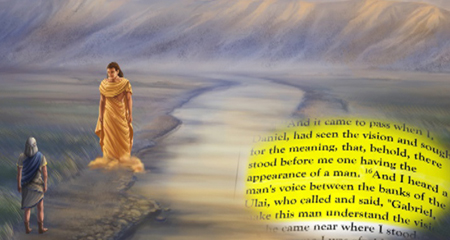 Daniel 8:15 and 16 And it came to pass, when I, Daniel, had seen the vision, and sought for the meaning, that, behold, there stood before me one having the appearance of a man. And I heard a man’s voice between the banks of Ulai, who called, and said, “Gabriel, make this man understand the vision.”
Daniel 8:15 and 16 And it came to pass, when I, Daniel, had seen the vision, and sought for the meaning, that, behold, there stood before me one having the appearance of a man. And I heard a man’s voice between the banks of Ulai, who called, and said, “Gabriel, make this man understand the vision.”
Just like in Daniel chapter 7, the prophet first sees these amazing visions and then it’s explained to him by an angel. Only this time, there was a man’s voice who gave the angel Gabriel orders to help Daniel understand it all. Who could that “Man” have been giving those orders to the angel Gabriel? I’m pretty sure it was that “Son of Man” again.
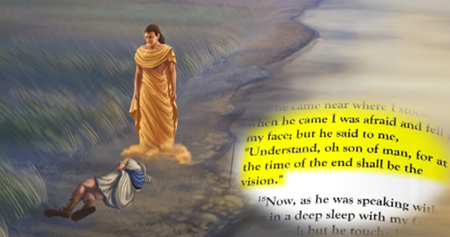 Verse17 So he came near where I stood: and when he came, I was afraid, and fell upon my face: but he said to me, “Understand, O son of man: for at the time of the end shall be the vision.”
Verse17 So he came near where I stood: and when he came, I was afraid, and fell upon my face: but he said to me, “Understand, O son of man: for at the time of the end shall be the vision.”
Seeing an angel in his glory up close must be an awesome thing. Daniel was afraid. But Gabriel comforted him and told him, for the first time here, that “at the time of the end shall be the vision”.
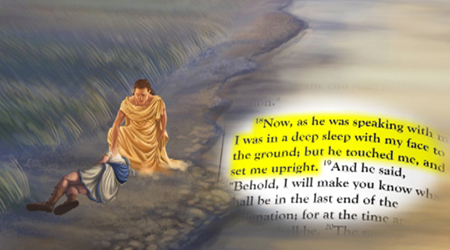 Verse 18 Now as he was speaking with me, I was in a deep sleep with my face to ground: but he touched me, and set me upright.
Verse 18 Now as he was speaking with me, I was in a deep sleep with my face to ground: but he touched me, and set me upright.
It sounds like Daniel perhaps fainted or was just almost overwhelmed by all this. But Gabriel touched him and set him upright. This must have all been pretty important to God and he needed Daniel in good enough condition to be able to receive this extremely important message he was being given.
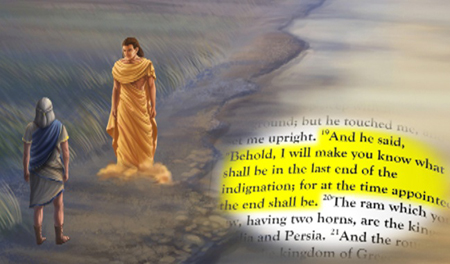 Verse 19 And he said, “Behold, I will make you know what shall be in the last end of the indignation; for at the time appointed the end shall be.”
Verse 19 And he said, “Behold, I will make you know what shall be in the last end of the indignation; for at the time appointed the end shall be.”
So three times in two verses the angel Gabriel says that this vision is about “the end”. God doesn’t have an angel say something three times just for effect. Very few times in the whole Bible does God say something three times, and when He does, it’s important.
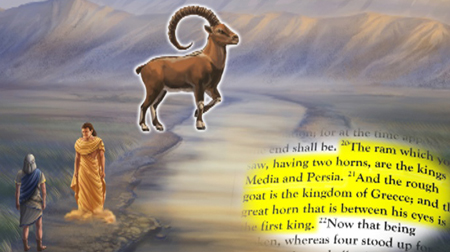 Verses 20 and 21 The ram which you saw, having two horns, are the kings of Media and Persia. And the rough goat is the kingdom of Greece; and the great horn that is between his eyes is the first king.
Verses 20 and 21 The ram which you saw, having two horns, are the kings of Media and Persia. And the rough goat is the kingdom of Greece; and the great horn that is between his eyes is the first king.
Gabriel is explaining to Daniel what these beasts are. They represent the Medo-Persian Empire and the empire of the Greeks, led by Alexander the Great.
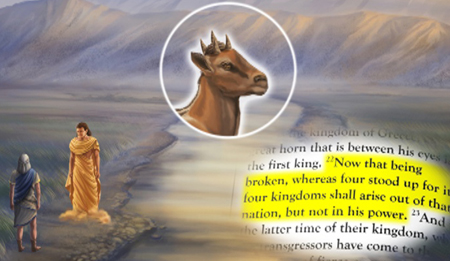 Verse 22 Now that being broken, whereas four stood up for it, four kingdoms shall arise out of the nation, but not in his power.
Verse 22 Now that being broken, whereas four stood up for it, four kingdoms shall arise out of the nation, but not in his power.
Gabriel explains the significance of “the great horn”. The king of Greece who was to come would be broken, while he was still strong, and his kingdom would be divided into four parts. And, just as we have seen already from history, this did happen.
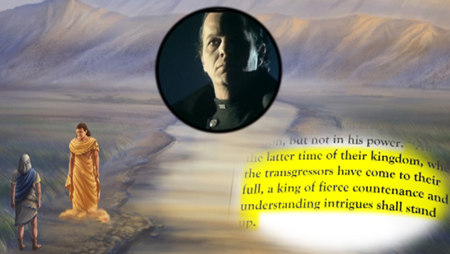 Verse 23 And in the latter time of their kingdom, when the transgressors have come to their full, a king of fierce countenance, and understanding intrigues shall stand up.
Verse 23 And in the latter time of their kingdom, when the transgressors have come to their full, a king of fierce countenance, and understanding intrigues shall stand up.
And here begins the angel’s description of the “little horn” of the end time. When “transgressors are come to the full”, when the people of the earth have fallen away from God and turned away from His love and truth, “a king of fierce countenance shall stand up”. Your continence is your expression so a king of an angry, vicious expression will a stand up. He will also be a man of subtlety, intrigues and spiritual darkness.
Verse 24 And his power shall be mighty, but not by his own power: he shall destroy fearfully, and shall prosper, and practice, and he shall destroy the mighty and the holy people.
I don’t like to dwell on the works of the devil. But the Bible is clear here that this man will be mighty, though the power of Satan. He will be a destroyer in an awesome way, having his own way for a limited time. And here it says “he shall destroy the mighty and the holy people.”
I believe he will attempt to destroy the people with a living faith in, and worshippers of, the God of Abraham, whoever they may be. Because they will recognize him for who he is: the man of sin, the Antichrist, the Dejal. But he won’t destroy them all.  There are prophecies we’ve not yet read about this period of time that make it clear that “the people who know their God shall be strong, and carry out great exploits.” That’s from later in Daniel, chapter11, verse 32, again very much focusing on these final days of the endtime and “the people who know their God”. Maybe you’ll be one of those people.
There are prophecies we’ve not yet read about this period of time that make it clear that “the people who know their God shall be strong, and carry out great exploits.” That’s from later in Daniel, chapter11, verse 32, again very much focusing on these final days of the endtime and “the people who know their God”. Maybe you’ll be one of those people.
Verse 25 Through his cunning he shall cause deceit to prosper under his rule. And he shall magnify himself in his heart, and by peace shall destroy many. He shall also stand up against the Prince of princes; but he shall be broken without hand.
In another translation it says “by his understanding he shall cause craftiness to succeed”. His very nature and soul will be to lie and do evil. And as we read before, he shall “magnify himself”, the ultimate man of pride.
“And by peace shall destroy many”. Dictators from the beginning have used lies and false peace to ultimately destroy many.  And at this point in Daniel another translation gives what might be some added insight into who this Antichrist fights the most successfully. The other translation says here, in verse 25 “he shall destroy many in their prosperity”.
And at this point in Daniel another translation gives what might be some added insight into who this Antichrist fights the most successfully. The other translation says here, in verse 25 “he shall destroy many in their prosperity”.
So it could be the holy people referred to here might be more accurately understood as the high profile churches, synagogues and mosques which have often been targets of Godless and anti-religious regimes when they’ve come to power. And it even says, amazingly here, “He shall also stand up against the Prince of princes”.
This man will defy and mock the Prince of princes, Jesus Christ, in order to have the worship that Satan has always wanted for himself. But he will come to his end, “he shall be broken without hand.”
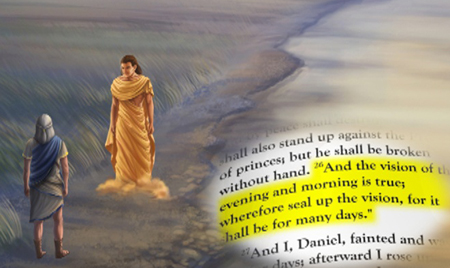 Verse 26 And the vision of the evening and morning is true; wherefore seal up the vision, for it shall be for many days.
Verse 26 And the vision of the evening and morning is true; wherefore seal up the vision, for it shall be for many days.
The angel again tells Daniel that it’s all true. But that it’s not for him or his time. So he should seal the vision for many days, for a distant time to come.
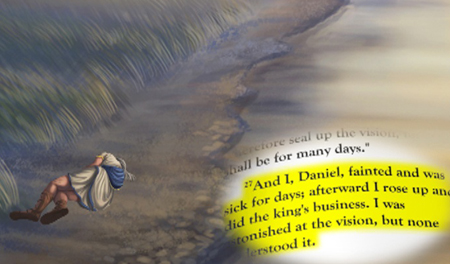 Verse 27 And I, Daniel, fainted and was sick for days; afterward I rose up and did the king’s business. I was astonished at the vision, but none understood it.
Verse 27 And I, Daniel, fainted and was sick for days; afterward I rose up and did the king’s business. I was astonished at the vision, but none understood it.
 It sounds like this experience was so heavy on Daniel that he actually fainted twice. And he was sick for days afterwards. Thank God for such a faithful prophet to be a vessel the Lord could use to give us these messages.
It sounds like this experience was so heavy on Daniel that he actually fainted twice. And he was sick for days afterwards. Thank God for such a faithful prophet to be a vessel the Lord could use to give us these messages. 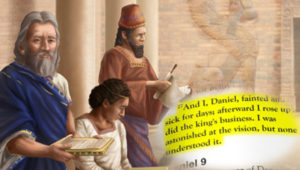 So Daniel went back to being a minister of the king of Babylon at that time. He was astonished at the vision but he didn’t know what it all meant. He just recorded it for the people of the future, to whom it was for.
So Daniel went back to being a minister of the king of Babylon at that time. He was astonished at the vision but he didn’t know what it all meant. He just recorded it for the people of the future, to whom it was for.
We’ve come a long way already. But honestly, we still have the most amazing parts ahead of us. Each chapter prepares us for the next and that’s how this one has been. Some of this may have been a little difficult to understand. But it all will be clearer in Daniel chapter 9, which is considered to be perhaps the most astonishing prophecy in the entire Bible. I so much look forward to sharing that with you soon, God bless you.
Bro. Mark, thank you for these studies on Daniel, I can’t hardly wait to study Chapter 9. What a insight to things to come ,along with knowledge of things past! God bless and able you to keep the knowledge of his word coming to us thru these studies!
Thanks for your encouraging words. There will be a new supplementary video to Daniel 8 up in the next few days and one more supplementary one to Daniel 8 in around a month. After that I’ll be concentrating on the two Daniel 9 videos, the first one about “The 69 Weeks”, incredible already-fulfilled prophecy which even most Christians don’t know about. After that will be “The Last 7 Years”, based around the last verse in Daniel 9, along with Matthew 24 where Jesus spoke of that verse and further explained its meaning to His disciples when they asked about His second coming. Thanks for your prayers for these projects.